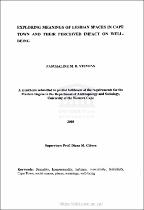Exploring meanings of lesbian spaces in Cape Town and their perceived impact on well-being
Abstract
Cape Town is perceived as one of the'gay capitals'of the world, yet many individuals who identify as homosexual still experience danger and harassment in this city in their everyday lives. This qualitative study was conducted with seven lesbians who live in various locations in Cape Town and who belong to different racial groups. The research focused on how lesbians experience and utilise social spaces to the benefit of their wellbeing. This thesis not only explores the meanings they attach to these spaces, it also ascertains that positive associations with places create a sense of wellness for the women in this study. Thirteen indepth interviews were conducted, and the relevant parts
pertaining to this research, were transcribed verbatim and analysed using thematic content analysis. The findings demonstrate how these women negotiating their sexual identities in public spaces on a daily basis. They are constantly aware of their surroundings which, in tum, determine the level of self-surveillance of their behaviour. When in predominantly heterosexual public spaces, they tentatively display affection towards their partners if they perceive that environment to be potentially unsafe. Lesbian identified spaces are found to be places of safety and comfort for these women and offer the freedom for the exploration of their sexual orientation. I also illustrate that these
women are not passive bystanders being subjected to potential violence, take control of their personal safety. They demonstrate agency - they cope with, and live beyond the threat of harassment and hostility.

